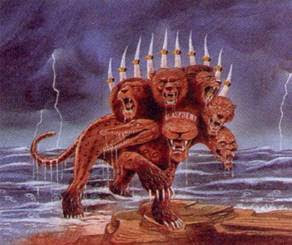Decoding the Seven-Headed Beast: Unveiling the Revelation
The seven-headed beast. It's a creature that's haunted imaginations for centuries, emerging from the cryptic depths of the Book of Revelation. This monstrous figure, shrouded in mystery and dripping with symbolic meaning, isn't just a scary bedtime story. It's a complex and multi-layered image that continues to fascinate and provoke discussion, prompting us to question its origins, its meaning, and its relevance in our modern world.
The beast's imagery is undeniably potent. Seven heads, often crowned, rise from the tumultuous sea, embodying a sense of chaotic power and dominion. This isn't just some random monster; it's a carefully constructed symbol, deliberately designed to evoke a visceral reaction. But what does this symbolic creature truly represent? That's the question that has captivated theologians, scholars, and curious minds for generations.
Trying to understand the beast of Revelation requires a deep dive into the historical and cultural context surrounding the text. The Book of Revelation, attributed to John the Apostle, was written during a time of intense persecution for early Christians. Understanding this backdrop of political turmoil and religious oppression is essential for grasping the symbolic language John employed. The beast, some argue, represents the oppressive Roman Empire, its seven heads symbolizing seven emperors or seven hills of Rome. Others interpret it as a more general symbol of earthly power corrupted by evil.
The significance of the seven-headed beast extends far beyond its historical context. It has resonated through centuries of art, literature, and popular culture, becoming a powerful archetype of evil and tyranny. Its imagery has been reinterpreted and reimagined, appearing in everything from medieval illuminated manuscripts to modern-day graphic novels. This enduring presence speaks to the profound impact of the beast's symbolism on our collective consciousness.
Unraveling the mystery of the seven-headed beast isn’t just about deciphering ancient prophecies; it’s about understanding the ongoing struggle between good and evil, power and oppression. It prompts us to grapple with complex questions about the nature of authority, the dangers of unchecked power, and the importance of resisting tyranny in all its forms. Whether interpreted literally or metaphorically, the beast serves as a stark warning against the seductive nature of power and the devastating consequences of its abuse.
Some interpretations suggest the heads represent seven kingdoms or empires throughout history, each persecuting God's people. The number seven often symbolizes completeness or fullness in biblical numerology, potentially signifying the complete manifestation of earthly power opposed to divine authority.
Examining the beast’s features in Revelation reveals much about its symbolic meaning. The crowns on its heads signify authority and power. Its emergence from the sea, often associated with chaos and the unknown, suggests an unpredictable and dangerous force. These details, woven together, create a powerful image of a chaotic and oppressive force threatening to overwhelm the world.
One perspective suggests that understanding the beast allows for greater discernment in recognizing oppressive systems and ideologies in the modern world. Another possible benefit is that it fosters critical thinking about the nature of power and its potential for corruption. Further, exploring the beast can deepen understanding of the historical and cultural context of the Book of Revelation, enriching one's engagement with this complex and influential text.
Common questions surrounding the beast include its true identity, the meaning of its seven heads and ten horns, and its relationship to other figures in Revelation such as the dragon and the false prophet. Different interpretations offer various answers, leading to ongoing debates and discussions.
Tips for understanding the beast include studying the historical context of Revelation, exploring different interpretations, and considering the symbolic language used throughout the book. Remembering that the text is highly symbolic can prevent misinterpretations and encourage a deeper understanding of its message.
In conclusion, the seven-headed beast of Revelation remains a captivating and enigmatic figure, provoking thought and debate even centuries after its first appearance. While its precise meaning remains open to interpretation, the beast serves as a potent reminder of the dangers of unchecked power and the ongoing struggle against oppressive forces. Understanding its symbolism, historical context, and various interpretations can offer valuable insights into the complexities of the Book of Revelation and its enduring relevance in today's world. By engaging with this powerful imagery, we can deepen our understanding of the ongoing struggle between good and evil and the importance of resisting tyranny in all its forms. Exploring the beast and its multifaceted interpretations continues to be a journey of discovery, offering a unique lens through which to examine the complexities of power, faith, and the human condition. It is a call to remain vigilant against oppressive forces and to strive for a world where justice and righteousness prevail.
Tattoo bear head images a roaring trend in body art
Wiring wonders decoding the red black and white wires of your light switch
Decoding so sorry memes from awkward to hilarious














